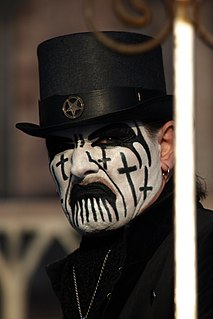A Quote by Ricky Gervais
Atheism is the lack of belief in a god (or gods). It makes no claim. It merely rejects the claim that a god (or gods) exists. Nothing more.
Related Quotes
Obviously, if theism is a belief in a God and atheism is a lack of a belief in a God, no third position or middle ground is possible. A person can either believe or not believe in a God. Therefore, our previous definition of atheism has made an impossibility out of the common usage of agnosticism to mean "neither affirming nor denying a belief in God."
Could God exist if nobody else did? No. That’s why gods are very avid for worshipers. If there is nobody to worship them, there are no gods. There are as many gods as there are people thinking about God. In choosing your god, you choose your way of looking at the universe. There are plenty of Gods. Choose yours. The god you worship is the god you deserve.
Atheism ... in its philosophic aspect refuses allegiance not merely to a definite concept of God, but it refuses all servitude to the God idea, and opposes the theistic principle as such. Gods in their individual function are not half as pernicious as the principle of theism which represents the belief in a supernatural, or even omnipotent, power to rule the earth and man upon it. It is the absolutism of theism, its pernicious influence upon humanity, its paralyzing effect upon thought and action, which Atheism is fighting with all its power.
Gods? Don't let that impress you. Anyone can be a god if they have enough worshippers. You don't even have to have powers anymore. In my time I've seen theatre gods, gladiator gods, even storyteller gods - you people see gods everywhere. Gives you an excuse for not thinking for yourselves. God is just a word. Like Fury. like demon, Just words people use for things they don't understand. Reverse it and you get dog. It's just as appropriate.
The apparent multiplication of gods is bewildering at the first glance, but you soon discover that they are the same GOD. There is always one uttermost God who defies personification. This makes Hinduism the most tolerant religion in the world, because its one transcendent God includes all possible gods. In fact Hinduism is so elastic and so subtle that the most profound Methodist, and crudest idolater, are equally at home with it.
The Christian claim is: Nothing explains the facts better than an all-powerful, all-knowing, omnipresent god creating the universe and sending Jesus to spread his message. This is about as remarkable a claim as could be stated, and yet it is tossed out lightly. Christians seem to imagine that "God did it" is as plausible as the natural explanation that stories grow with the retelling. The Christian has the burden of proof, and it's an enormous burden given this enormous claim.
There are two gods. The god our teachers teach us about, and the God who teaches us. The god about whom people usually talk, and the God who talks to us. The god we learn to fear, and the God who speaks to us of mercy. The god who is somewhere up on high, and the God who is here in our daily lives. The god who demands punishment, and the God who forgives us our trespasses. The god who threatens us with the torments of Hell, and the God who shows us the true path.
There are two gods. A god who casts us off because of our sins, and a God who calls to us with His love.
No it's not!" said Constable Visit. "Atheism is a denial of a god." "Therefore It Is A Religious Position," said Dorfl. "Indeed, A True Atheist Thinks Of The Gods Constantly, Albeit In Terms of Denial. Therefore, Atheism Is A Form Of Belief. If The Atheist Truly Did Not Believe, He Or She Would Not Bother To Deny.
The truth wears longer than all the gods; for it is only in the truth's service, and for love of it, that people have overthrown the gods and at last God himself. "The truth" outlasts the downfall of the world of gods, for it is the immortal soul of this transitory world of gods; it is Deity itself.




































